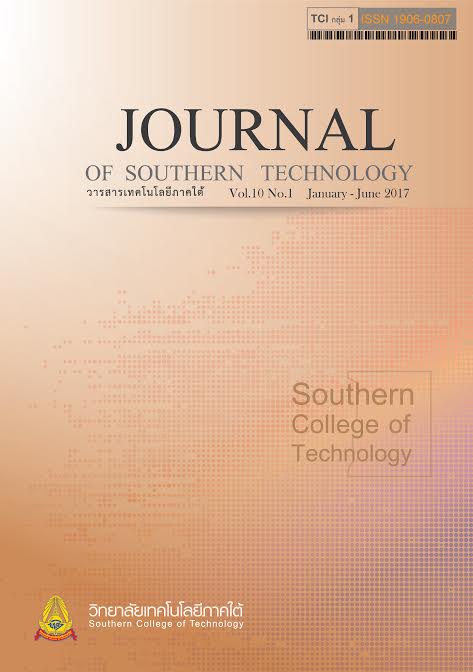สมรรถนะของบัณฑิตวิทยาลัยเทคโนโลยีภาคใต้ (SCT) ที่สําเร็จการศึกษาตามกรอบ มาตรฐานคุณวุฒิระดับอุดมศึกษาแห่งชาติตามทัศนะของผู้ใช้บัณฑิต
Main Article Content
Abstract
สมรรถนะของบัณฑิตวิทยาลัยเทคโนโลยีภาคใต้ (SCT) ที่สําเร็จการศึกษาตามกรอบ มาตรฐานคุณวุฒิระดับอุดมศึกษาแห่งชาติตามทัศนะของผู้ใช้บัณฑิต
งานวิจัยนี้มีวัตถุประสงค์เพื่อศึกษาสมรรถนะของบัณฑิตวิทยาลัยเทคโนโลยีภาคใต้ จํานวน 7 สาขาวิชา คือ บริหารธุรกิจ การบัญชี ระบบสารสนเทศคอมพิวเตอร์ เทคโนโลยีสารสนเทศ การจัดการเทคโนโลยี รัฐศาสตร์ และการ ท่องเที่ยว ตามกรอบมาตรฐานคุณวุฒิระดับอุดมศึกษาแห่งชาติ ตามทัศนะของผู้ใช้บัณฑิต ใน 5 ด้าน เพื่อเปรียบเทียบ สมรรถนะของบัณฑิตตามกรอบมาตรฐานคุณวุฒิระดับอุดมศึกษาแห่งชาติ ตามสาขาวิชา ประเภทของสถานประกอบการ ความตรงกับสาขาวิชาที่จบมา และระยะเวลาในการปฏิบัติงานของบัณฑิต และเพื่อศึกษาความคิดเห็นเกี่ยวกับสมรรถนะย่อย ของบัณฑิตวิทยาลัยเทคโนโลยีภาคใต้ กลุ่มตัวอย่างที่ใช้ในการวิจัย คือ สถานประกอบการที่บัณฑิตจากวิทยาลัยเทคโนโลยี ภาคใต้ เข้าปฏิบัติงาน ตั้งแต่ พ.ศ. 2555-2557 จํานวน 114 สถานประกอบการ เครื่องมือที่ใช้ในการวิจัยเป็นแบบสอบถาม สมรรถนะของบัณฑิต แบบประมาณค่า 5 ระดับ มีค่าความเชื่อมั่นทั้งฉบับที่ระดับ 0.95 สถิติที่ใช้ในการวิเคราะห์ข้อมูล ประกอบด้วยค่าเฉลี่ย ค่าเบี่ยงเบนมาตรฐาน และการวิเคราะห์ความแปรปรวน (F-test) ผลการวิจัยพบว่า สมรรถนะของบัณฑิตที่สําเร็จการศึกษาตามกรอบมาตรฐานคุณวุฒิระดับอุดมศึกษาแห่งชาติตาม ทัศนะของผู้ใช้บัณฑิต ในภาพรวมทั้ง 5 ด้าน มีสมรรถนะอยู่ในระดับดี เมื่อพิจารณาแต่ละด้าน พบว่า มีสมรรถนะอยู่ในระดับดี ทุกด้าน และด้านที่มีคะแนนเฉลี่ยสูงสุด คือ ด้านคุณธรรม จริยธรรม รองลงมา คือ ด้านทักษะความสัมพันธ์ระหว่างบุคคลและ ความรับผิดชอบ และด้านที่มีค่าเฉลี่ยต่ําสุด คือ ด้านทักษะทางปัญญา และเมื่อพิจารณาเป็นสาขาวิชาพบว่า ทุกสาขาวิชามี สมรรถนะโดยรวมอยู่ในระดับดี ผลการเปรียบเทียบสมรรถนะโดยรวมของบัณฑิตตามตัวแปรสาขาวิชา ประเภทของสถาน ประกอบการ ความตรงของสาขาวิชาที่จบมา และตามระยะเวลาที่บัณฑิตเข้าปฏิบัติงาน ปรากฏว่าไม่แตกต่างกันอย่างมี นัยสําคัญทางสถิติ ทุกตัวแปร ยกเว้นตัวแปรสาขาวิชา ในภาพรวมไม่แตกต่างกัน แต่เมื่อพิจารณาเป็นรายด้านมีความแตกต่าง กันอย่างมีนัยสําคัญทางสถิติ จํานวน 3 ด้าน คือ ด้านคุณธรรมจริยธรรม ที่ระดับ .01 ด้านทักษะความสัมพันธ์ระหว่างบุคคล และความรับผิดชอบ ที่ระดับ .05 และด้านทักษะการสื่อสารและการใช้เทคโนโลยีสารสนเทศ ที่ระดับ .05 นอกจากนี้ยังพบว่า มีสมรรถนะย่อยที่ดีกว่าสถาบันอื่น 4 สมรรถนะ และด้อยกว่าสถาบันอื่น 2 สมรรถนะ และมีข้อเสนอแนะให้มุ่งพัฒนาทักษะ การบริหารจัดการและทักษะด้านภาษาอังกฤษเพิ่มเติม
Competencies of Southern College of Technology (SCT) Graduates Based on Thai Qualifications Framework (TQF) for Higher Education Perceived by Graduate Consumers
This research aimed to explore competencies of Southern College of Technology (SCT) graduates in 7 fields of study: Business Administration, Accounting, Computer Information System, Information Technology, Technology Management, Political Science, and Tourism that were based on TQF for Higher Education perceived by graduate consumers in 5 domains in relevance to types of workplace, job-related to graduates’ fields of study, and amount of graduates working time, including opinions concerning subcompetencies. The samples were 114 graduate consumers at workplaces where SCT graduates were working during 2012-2014. The research instrument used for data collection was a 5-point rating-scale questionnaire asking about graduates’ competencies. The reliability of the questionnaire was .95. The statistics used for data analysis were mean, standard deviation, and analysis of variance (F-test). The results of the study were as follows: 1) the graduates’ overall 5 domains of competencies based on TQF perceived by graduate consumers were at a good level. When considering each domain, every domain was also at a good level. The highest mean score was ethics and morals, the second highest was interpersonal skills and responsibility, and the lowest mean score was intellectual skills. When considering each field of study, overall graduates’ competencies were at a good level. 2) the comparison results of the overall competencies in relevance to types of workplace, job-related to graduates’ fields of study, and amount of time graduates working revealed that there were no statistically significant differences. There were significant differences between fields of study in ethics and morals, at .01 level, interpersonal skills and responsibility at .05 level, communication skills and information technology at .05 level. In addition four superior and two inferior sub-competencies were found. Moreover, management and English skills were suggested for further development.
Article Details
-
Authors must agree to the journal publication rules and allow the editors to edit the manuscripts for publication.
-
Author’s right belongs to the author but Journal of Southern Technology holds the right of first publication and thus allow readers to use the article for the purpose of education but not commercial.

